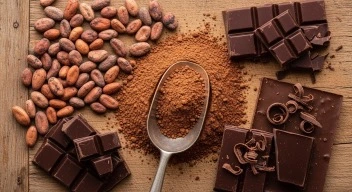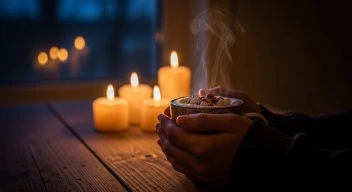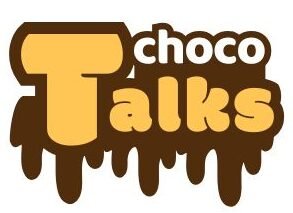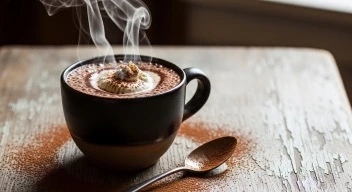Hot chocolate feels like the kind of comfort drink that needs no explanation — velvety, soothing, and nostalgic. But behind that warm mug hides a surprising question: does hot chocolate have caffeine?
If you’ve ever sipped a cup late at night and wondered why you couldn’t quite fall asleep, or if you’ve told yourself it’s “just cocoa, not coffee,” you’re not alone. Most people assume hot chocolate is caffeine-free, but that’s not entirely true. The truth lies somewhere between indulgence and science.
In this article, we’ll explore what really determines caffeine in hot chocolate, how it compares to coffee or tea, and whether your favorite cozy drink fits into a caffeine-sensitive lifestyle. You’ll also learn why the type of cocoa matters — and why not all hot chocolates are created equal.
Cocoa vs. Caffeine: Understanding the Basics
All chocolate comes from the cacao bean, a natural source of caffeine. Every bean contains compounds such as theobromine and caffeine, both stimulants that influence mood and alertness.
That means even your innocent mug of hot chocolate will contain a trace of caffeine. The exact amount depends on how it’s made.
- A typical 8-ounce cup of homemade hot cocoa has about 5 mg of caffeine.
- A cup made with pure cocoa powder can contain 10–25 mg.
- Compare that with a regular 8-ounce coffee, which averages 95 mg.
So yes — hot chocolate contains caffeine, but far less than coffee or even green tea. Most people can enjoy it without the buzz.
Want to know more about cocoa’s benefits? Read our deep dive: Is Dark Chocolate Really Healthy?
See the USDA’s official caffeine comparison chart.
What Affects the Caffeine in Hot Chocolate?
Not all hot chocolate is equal in caffeine content. The differences come from ingredients, cocoa concentration, and preparation.
1. Type of Chocolate or Cocoa Used
- Natural cocoa powder has the highest caffeine content because it’s less processed.
- Dutch-processed cocoa is milder, with slightly lower caffeine levels due to alkalization.
- Instant mixes often contain added sugar and milk powder — they taste sweet but may use less cocoa, meaning less caffeine.
f you’re curious about cocoa types, see Dark vs. Milk Chocolate: The Surprising Health Differences You Need to Know
2. Serving Size
The more cocoa you use, the more caffeine you get. A small teacup may have only 5 mg, but a large 12-ounce café drink can easily reach 20 mg or more.
3. Added Chocolate Pieces or Syrup
When melted chocolate or syrup is added, caffeine increases. Milk chocolate syrup adds a little; dark chocolate chunks add a lot more.
4. Temperature and Steeping Time
Caffeine extracts more efficiently in heat. The longer your cocoa sits and steeps, the more caffeine it releases into the liquid — though still much less than coffee or tea.
The Other Stimulant in Chocolate: Theobromine
While caffeine grabs the headlines, theobromine plays a bigger role in how hot chocolate affects your body. It’s a mild stimulant found naturally in cocoa that provides a gentle boost without the jitteriness of caffeine.
Theobromine promotes alertness, mood elevation, and heart health in moderate amounts. It’s one of the reasons chocolate feels energizing but soothing at the same time.
A Frontiers in Nutrition study found that cocoa’s combination of caffeine and theobromine supports mental focus and relaxation simultaneously — a unique duo not found in coffee alone.
Comparing Popular Hot Chocolate Types by Caffeine Content
| Type | Caffeine (8 oz) | Notes |
| Instant Hot Chocolate Mix | 3–5 mg | Lowest caffeine; mostly sugar and milk powder |
| Homemade with Cocoa Powder | 10–25 mg | Depends on brand and cocoa percentage |
| Café-Style with Melted Chocolate | 20–35 mg | Often uses real dark chocolate |
| White Chocolate Drink | 0 mg | White chocolate has no cocoa solids |
| Dark Chocolate Cocoa (70%+) | 25–45 mg | Richest flavor and highest caffeine |
You can see that while caffeine exists in all cocoa drinks except white chocolate, the range is modest compared with coffee.
Does Hot Chocolate Keep You Awake?
For most people, no — the caffeine level in hot chocolate isn’t enough to disrupt sleep unless consumed in very large amounts or close to bedtime. But caffeine sensitivity varies.
If you’re particularly sensitive, drink hot chocolate earlier in the evening or choose a lighter mix. You can also use carob powder, a naturally caffeine-free chocolate alternative.
If you’re looking for healthier ways to enjoy chocolate, see Bone Broth Hot Chocolate: The Surprising Superfood Drink You’ll Actually Love
Hot Chocolate vs. Coffee vs. Tea: The Real Numbers
Does hot chocolate have caffeine

Does hot chocolate have caffeine
Let’s compare average caffeine levels in an 8-ounce serving:
| Drink | Caffeine (mg) |
| Black Coffee | 95 |
| Espresso (1 oz shot) | 63 |
| Black Tea | 47 |
| Green Tea | 28 |
| Hot Chocolate | 5–25 |
Even strong dark hot chocolate sits at roughly one-fourth the caffeine of green tea and less than one-fifth of coffee. That’s why it’s often safe for kids, evening treats, or caffeine-sensitive individuals — though moderation still matters.
Why Hot Chocolate Feels “Energizing” Anyway
Even with low caffeine, hot chocolate still perks you up. Why?
- Sugar spikes dopamine, the reward hormone, creating a short energy lift.
- Warmth and texture create comfort, which reduces stress and enhances alertness.
- Cocoa flavonoids increase blood flow to the brain, improving focus.
A Nutrients journal study concluded that cocoa polyphenols enhance mood and cognitive performance — without the overstimulation associated with coffee.
Does the Brand of Cocoa Matter?
Absolutely. Cocoa quality influences both caffeine levels and nutrient content.
Premium cocoa powders like Valrhona or Ghirardelli typically have higher cocoa solids and, therefore, slightly more caffeine — but also richer antioxidants and flavor. Cheaper instant mixes, while convenient, deliver mostly sugar and filler.
Want to explore chocolate quality deeper? Check out Choco Milk Review: All What You Need to Know
Hot Chocolate and Children
Parents often wonder whether it’s safe for kids. Generally, yes — if made from cocoa powder and milk with minimal sugar.
For reference:
- A small kid-sized cup (~6 oz) of cocoa contains less caffeine than a chocolate cookie or a small piece of milk chocolate.
- Moderation and portion control are key.
Experts from Mayo Clinic note that most children can safely consume under 45 mg of caffeine per day — the equivalent of several cups of hot cocoa.
When to Avoid Caffeine in Hot Chocolate
While small amounts are safe for most, certain people may want to limit intake:
- Pregnant individuals, who should keep total caffeine under 200 mg daily.
- Those with anxiety disorders or sleep issues, who may feel even low caffeine effects.
- People with heart arrhythmia or caffeine sensitivity.
If that’s you, enjoy hot chocolate earlier in the day or opt for white chocolate or caffeine-free carob blends.
Caffeine and Sleep: Myth vs. Reality
Does hot chocolate have caffeine

Does hot chocolate have caffeine
A common belief is that any caffeine before bed ruins sleep. But research shows individual differences matter more than exact timing. A Sleep Health journal study found that small evening doses (under 40 mg) had minimal impact on sleep for most adults.
Since hot chocolate rarely exceeds 25 mg, it’s generally considered safe as a nighttime beverage — unless you already struggle with caffeine metabolism.
So if a cup of cocoa is part of your bedtime ritual, you can rest easy (literally).
Healthy Ways to Make Hot Chocolate at Home
If you want the full chocolate experience with control over caffeine and sugar, homemade is best.
Basic Cozy Cocoa
• 1 cup milk or milk alternative
• 1 tablespoon unsweetened cocoa powder
• 1–2 teaspoons sugar or maple syrup
• ½ teaspoon vanilla extract
• Pinch of salt
Whisk over medium heat until smooth and warm. Top with foam or cream if desired.
You’ll get around 10 mg of caffeine, plus rich flavor and antioxidants.
Decaf Twist
Use white chocolate, carob powder, or a half-and-half cocoa blend to lower caffeine even more.
How Hot Chocolate Fits a Balanced Lifestyle
Enjoying hot chocolate mindfully — not guzzling it as a sugar bomb — adds warmth, pleasure, and even small wellness benefits.
Cocoa flavonoids can support heart health and blood flow; the emotional comfort reduces stress; the gentle stimulation keeps you alert without jitters. It’s a drink that nourishes both mind and mood.
Chocolate isn’t guilty pleasure; it’s joyful science.
Explore more about the emotional side of cocoa in Chocs and Cheers: Why Chocolate Makes Every Moment Better
Does hot chocolate have caffeine
The Takeaway
Hot chocolate isn’t caffeine-free — but it’s gentle enough for most people to enjoy daily. The caffeine comes naturally from the cocoa bean, not from additives or artificial boosters.
Most cups fall between 5 and 25 mg of caffeine, depending on ingredients. Compare that with coffee’s 95 mg, and you’ll see why hot chocolate feels cozy, not wired.
If you’re caffeine-sensitive, choose Dutch-processed cocoa, smaller portions, or carob blends. For everyone else, that evening mug is safe to savor.
It’s comfort in a cup — no jitters attached.

